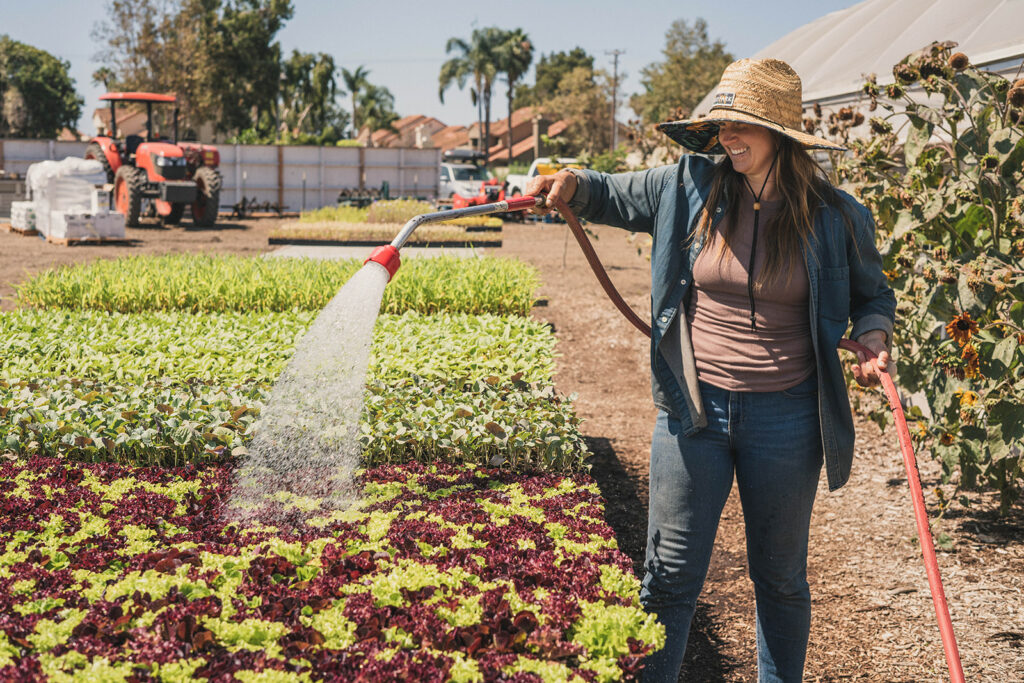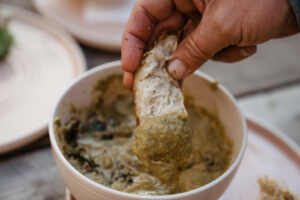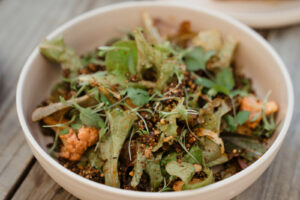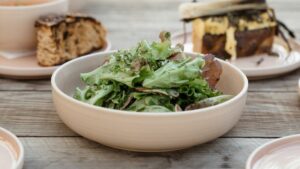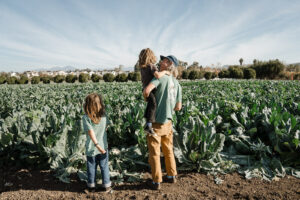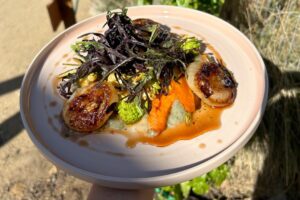As our Farm Production Coordinator here at The Ecology Center, Griffin Cassara has helped countless folks in our Village bring farm-fresh flavors into their gardens, homes, and kitchens by planning our crops, as well as planting and caring for the seedlings that eventually make their way into our fields and our nursery. This fall, with the opening of Campesino Café, she’ll be fulfilling the same role in a new arena: by helping our culinary team incorporate our autumn harvest into the café menu.
We connected with Griffin to get some sneak peeks into the delicious dishes that Campesino guests can look forward to. We also got her inside perspective on some of the exceptional features going into Campesino’s design, from the café’s zero-waste ethos to its embodiment of the holistic nourishment that’s possible within a regenerative food system.
Read our conversation with Griffin below, and click here to contribute to our crowdfunding campaign and help bring our vision of Campesino to life.
For those who don’t know, tell us about some of the day-to-day duties in your role.
As Farm Production Coordinator, I help to create and maintain the crop plan from seed to sale. My job is to dial in the quantity, quality, and timing of the diversity of crops we offer to all the different outlets of The Ecology Center.
The thing I enjoy most about my role is seeing the fields take shape from what is written down in the crop plan at the beginning of the season. It’s one thing to write out your ideal for how the growing season will play out, and another to turn that plan into action that benefits the community. I love seeing all the moving parts on the farm come together.
The thing I find most challenging is being willing to roll with the punches that come with farming. Nature isn’t always clued in with the plans we make as farmers—weird weather patterns and heavy pest pressures throw us some curveballs that affect plant health and ultimately crop yields. Remembering that we aren’t in full control and that adapting as necessary is a great life lesson.
How do you see yourself and your work contributing to The Ecology Center’s mission of creating an abundant future for all?
As farmers at The Ecology Center, we are constantly trying to work on the puzzle of how to grow the greatest amount of nutrient-dense food and beautiful flowers possible, while at the same time stewarding the land in the most responsible, regenerative way possible. It’s a lot of people and pieces that make the system work, and I am just one of the people here working to make sure we can pivot the crop plan when needed, find solutions to challenges in the field, and continue to grow a seamless, ecology-based farm community.
How does your function form part of the connective tissue of change in our Village?
A big part of having a farm that is sustainable is making sure that there is little waste. This includes respecting the energy that is being expended by the farmers, the soil, the off-farm inputs and water usage. If I can help make sure that our operation is tight and efficient, I feel like I am helping to make an impact on the ecology of our Village.
What other departments/initiatives does your work connect with, and how does that look?
I am grateful to be connected to many different departments at The Ecology Center. One of my favorite places on the farm is in the greenhouse, seeing the magic of a seed turn into a healthy plant babe destined for great things. I love being connected to the amazing field crews working so hard to make sure the plants and soil are getting the attention they need. I get the opportunity to connect to the talented culinary team, making sure they have the ingredients they are inspired by and in return get a new perspective on the veggies we are growing. I work with the retail team making sure what we have planned for the fields aligns with what customers are looking for and that the end products are good quality. And most importantly to me, I get to work with the land and experience the incredible wildlife that dances around the field rows, adding an extra layer of color and beauty to the work we are doing here.
In your opinion, what purpose does Campesino serve within The Ecology Center village?
It’s a way to show people how nourishing organic food can be, both physically and emotionally. My relationship with food completely changed when I started cooking based on what the farmers in my community were growing and providing me with. Our standard American diet is so removed from seasonal, fresh eating and lacks any type of connection to the land, and I am excited for the food coming out of the café to be an example of what’s possible in the kitchen when you use ingredients from your local farmers.
Can you share a bit about what will be harvested in the fall and how it might be implemented in Campesino’s menu?
In the fall we will be harvesting our milpa planting, the group of crops we are very excited about here: corn, beans and winter squash. The corn will be featured in the café in the form of polenta and tortillas, both blue and yellow. I know cooked beans will be a great staple in the cafe as well—we have six different heirloom varieties in the ground currently. We will also be harvesting a nice variety of specialty roots (rainbow carrots, watermelon radish, Hakkurei turnips, gold and red beets) which will make its way to the café in the form of a crudités plate. There will be lots of lettuce and fresh herbs for a market garden salad with a farm herb vinaigrette, as well as late season tomatoes and peppers, purple broccoli, kales, and chard.


